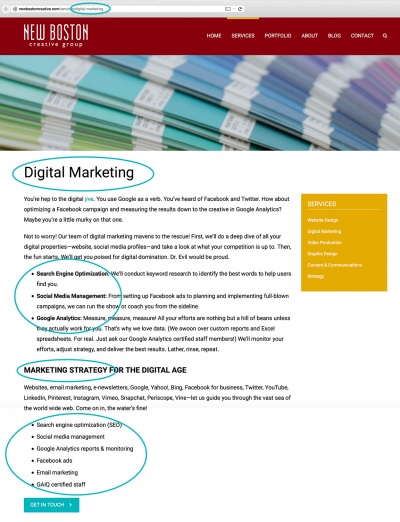SEO: Keyword Placement Still Matters For Getting Your Website Found on Google
by Kristin Brighton on August 4, 2015
Earlier in its history, search engine optimization (SEO) had a lot to do with placing keywords all over a webpage, as well as behind the scenes in metatag fields. A lot of people who didn’t truly understand the “magic” of how SEO worked latched on to the term, knowing that even though they didn’t quite understand metatags and how they worked, that they were important.
Many people jammed hundreds of search terms — every possible combination they could think of, with and without an “s” — in this “metatags” area, hoping and praying that the cybergods would bless their site with a bounty of visitors.
However, today’s search engines (a.k.a. Google) have matured. Instead of simply searching metatags for keywords mysteriously stuffed into a site’s code, Google primarily looks at:
- Your site’s authority
- How relevant your content is to the keywords people use to search for what you do or offer
- How user-friendly your website is
The end-result of Google weighting these three factors is people actually finding the information they are looking for when they conduct a search — quickly.
There is a tight correlation between SEO and content. Think of it like this: If your website is your house, then your content would be its foundation, and SEO would be how you would present your address so we can find you.
As digital marketing consultants, part of our job is conducting keyword research for clients: which keywords have search volume, are relevant, and provide you with a fair chance of achieving a high ranking for, given outside competition.
However, there is an “art” side to SEO. You need to create high-quality content that speaks to your target audience so that they will engage and even share that content so that you can start earning links. All this has to be done in a way that ensures the search terms are in places where Google looks for them.
Even though SEO is no longer just about where you put your keywords, placement still matters.
Top 5 Places to Position Keywords like a Pro:
- Page URL — The actual URL for each page of your site should feature the primary keyword for the content on that page. If you have one of those websites that names each page something like “/index.php?option+com_content&view=article&id=87,” then that needs to be fixed. Your users should be able to read the URL and know exactly what page they are on, something more like: “www.newbostoncreative.com/services/digital-marketing.” For most content management systems, this change in naming convention can be handled with a simple click of a box. If you don’t know how to change this, please ask your web developer. If he/she can’t change this for you, then reconsider your relationship. (URL naming convention is also a big deal when you monitor and analyze your site’s analytic data. It is very difficult and time consuming to look at rows of page numbers and not know to which page the data is referring).
- Headlines and Subheads — Use your most important keywords in your headlines (h1, h2) and subheads (h3, h4), which are big, bold type. When writers get all cutesy and creative in headlines to attract or entertain readers, they can actually be hurting themselves. Be straightforward and tell people (and Google) what the information is about.
- Text — Work in keywords into the basic language of your body copy, but don’t keyword stuff (meaning shove in a bunch of useless, redundant or unnecessary keywords that don’t enhance the reader’s understanding of your content)! Use keywords as naturally as you can. Make sure you think about your content like a reader: What information do people really expect to find about you on this page? Be sure you deliver that in a clear, concise, and compelling way.
- Bulleted or Numbered Lists — It is generally good advice when writing for the web for you to present content in a way that people can easily scan. Reading websites for information is not like curling up with a good book. People scan to find what they want to find as quickly as possible. Bulleted or numbered lists are a great way to increase the scanability of your content. And when you use bullets or numbering to bring attention to a word or phrase, you bring Google’s attention to it as well.
- Links — If you name all of your pages with keywords, you can easily create links within your site to other pages featuring keywords names. When you create an internal link, you are prioritizing it in Google’s eyes.
Here’s an example of how we optimized our digital marketing webpage, by working the term “digital marketing” and relevant keywords into the content very prominently.
 That’s it! Pretty straight-forward stuff, but you’ll be amazed how making these few simple changes can help your website climb up the rankings.
That’s it! Pretty straight-forward stuff, but you’ll be amazed how making these few simple changes can help your website climb up the rankings.
For these and other tips for getting found online, be sure to follow us on Facebook or Twitter.






